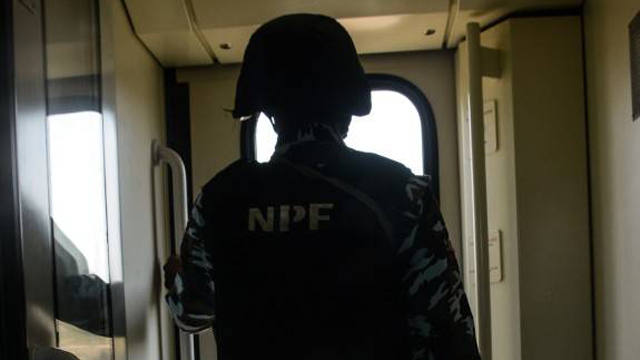FG LAUNCHES MULTI-AGENCY ANTI-KIDNAPPING UNIT TO COUNTER BANDITS AND TERRORISTS’ ABDUCTIONS NATIONWIDE
By : Odita Sunday, Abuja

A security man stand on guard inside a moving train during a test run/planned resumption of the Abuja-Kaduna train services, on November 27, 2022. This is coming after 8 months after the services was suspended due to terrorist attack on the Abuja-Kaduna train on March 28, 2022, kidnapping 168 passengers and killing eight others. (Photo by Olukayode Jaiyeola/NurPhoto) (Photo by Olukayode Jaiyeola / NurPhoto / NurPhoto via AFP)
The Federal Government has launched the State Expansion Programme of the Multi-Agency Anti-Kidnap Fusion Cell, aiming to strengthen collaboration between national security institutions and state-level commands.
Speaking at the official opening of the programme in Abuja, the National Coordinator of the National Centre Terrorism Centre (NCTC), Major General Adamu Garba Laka described the initiative as a “mission, not just a meeting,” and a critical component in bridging the gap between national coordination and ground-level intelligence in the fight against one of Nigeria’s most entrenched security threats.
“Kidnapping in Nigeria has evolved from occasional crimes into a sophisticated criminal enterprise,” the Coordinator noted, highlighting the involvement of organised networks with ties to terrorist and armed groups.
“These groups have turned abduction into a revenue-generating mechanism, using ransom payments to fund weapons, logistics, and territorial dominance. Where coordination is weak, fear thrives,” he added.
In response to this growing threat, the Nigerian government, in collaboration with the United Kingdom’s National Crime Agency, established the Multi-Agency Anti-Kidnap Fusion Cell.
The Cell has since contributed to several breakthroughs, aiding rescue missions, disrupting criminal networks, and improving the sharing of intelligence among Nigeria’s multiple security agencies.
However, the national coordinator acknowledged that national efforts alone are not sufficient.
“Too often, real-time intelligence and operational readiness are held at the state level.
“This programme is designed to create direct linkages between the Fusion Cell and state commands, strengthening early warning systems, intelligence flow, and rapid response,” he said.
The State Expansion Programme is part of a wider effort championed by the Office of the National Security Adviser (ONSA), led by Mallam Nuhu Ribadu, to foster a unified front against the menace of abduction.
He praised the impressive turnout of security stakeholders from across Nigeria and urged them to actively participate by sharing field experiences, voicing challenges, and proposing workable solutions to improve the effectiveness of the Cell.
Participants are expected to engage in multi-day sessions to build trust, share best practices, and ensure operational synergy that endures beyond the programme. Emphasis was placed on moving from reactive approaches to proactive, intelligence-led strategies.
Gratitude was extended to the UK Government, the National Crime Agency, and all institutional partners for their ongoing support and collaboration.
The coordinator concluded the address by officially declaring the programme open, expressing hope that the deliberations would contribute meaningfully to a safer Nigeria, “a country where no family should live under the threat of abduction, and no community should be held hostage by fear.”
The Guardian



Comments are closed.